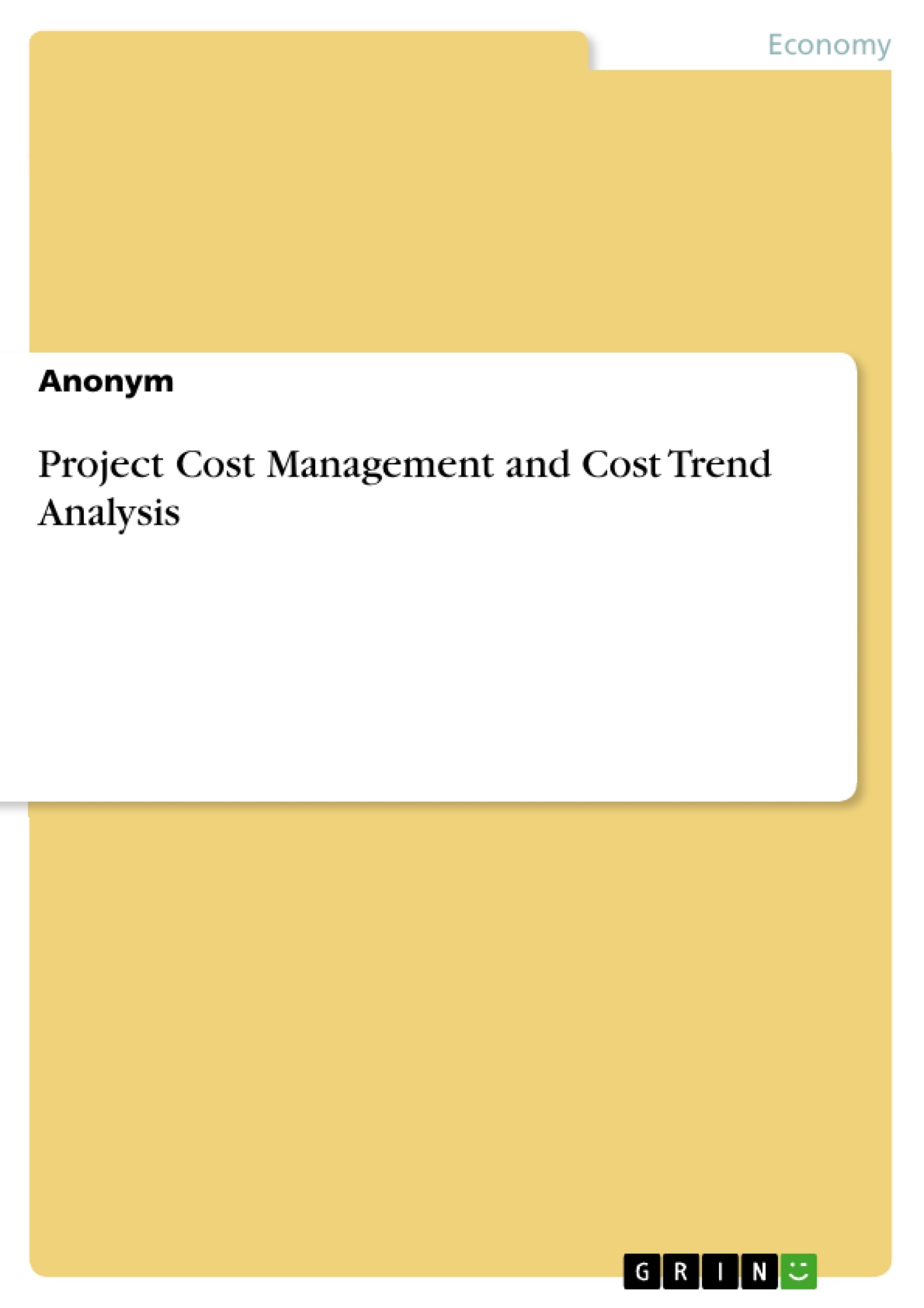This thesis deals with several aspects of project cost management with a focus on “Cost Trend Analysis”. First it shall give the reader a short explanation of the term “cost management” and the necessity of this process. In addition to that, the text describes the three steps of cost management in projects. Those are cost estimating, cost budgeting and cost control. The cost control tool “Cost Trend Analysis” is described and reviewed in more detail so that the reader gets the ability to create a critical view individually. Finally the thesis summarizes the findings in a conclusion.
It is no rarity, that the costs of a project exceed pre-estimated budgets. The origin of this exceeding often lays in the complexity of estimating, budgeting and controlling costs. Therefore cost management is an inevitable part of project management.
Inhaltsverzeichnis (Table of Contents)
- Introduction
- Term "Project Cost Management"
- Phases of Project Cost Management
- Cost Estimating
- Cost Budgeting
- Cost Control
- Cost Trend Analysis
- Structure
- Review
- Conclusion
Zielsetzung und Themenschwerpunkte (Objectives and Key Themes)
This thesis delves into various aspects of project cost management, aiming to provide a comprehensive understanding of its significance and practical application. It explores the definition and necessity of cost management, followed by a detailed examination of its three core phases: cost estimating, cost budgeting, and cost control. With a particular focus on the "Cost Trend Analysis" tool, the thesis aims to offer a critical perspective and empower readers to develop their own informed insights. The text concludes by summarizing the key findings and insights gained throughout the analysis.
- The significance and necessity of project cost management
- The three key phases of project cost management: estimating, budgeting, and controlling
- The role of the "Cost Trend Analysis" tool in project cost management
- A critical review of the "Cost Trend Analysis" tool
- A comprehensive overview of the findings and insights related to project cost management
Zusammenfassung der Kapitel (Chapter Summaries)
The introduction emphasizes the importance of cost management in projects, recognizing the frequent occurrence of cost overruns and the need for effective strategies to prevent them. It establishes the thesis's structure, outlining its key areas of focus: defining cost management, examining its phases, and delving into cost trend analysis. The following chapter defines the term "Cost Management," breaking it down into its components: "cost" and "management." The text explores different cost elements, categorizing them into internal staff, external staff, and materials, further elaborating on each category using PMBOK definitions. It then introduces the management cycle, outlining its four steps and how they apply to cost management. By combining these terms, the chapter emphasizes the importance of managing project finances efficiently across all phases.
The next section dives into the three phases of project cost management: cost estimating, cost budgeting, and cost control. It first examines cost estimating, highlighting its importance in predicting potential costs before project execution. This chapter discusses the challenges of accurate estimation, especially early in the project, and emphasizes the need for continuous monitoring as new information becomes available. It also touches upon the delicate balance between overestimating and underestimating costs, emphasizing the importance of adequate cost buffers to handle potential delays.
The chapter on cost budgeting focuses on the transformation of cost estimates into concrete project budgets. It explains the two main budgeting principles: top-down and bottom-up. The top-down approach involves setting a total budget for the entire project, which is then divided amongst individual work packages. The bottom-up approach, in contrast, starts with budgets for individual work packages, which are then aggregated into the overall project budget. The chapter concludes with a visual representation of these principles, demonstrating their differences in a clear and concise manner.
Schlüsselwörter (Keywords)
The primary focus of this thesis lies on Project Cost Management, encompassing various core concepts and areas of study. Key themes include cost estimation, cost budgeting, cost control, and cost trend analysis. The text delves into the practical applications of these concepts, particularly highlighting the "Cost Trend Analysis" tool. The thesis also touches upon industry standards, referencing publications like PMBOK (Project Management Body of Knowledge) and drawing upon various research findings from diverse sources.
Frequently Asked Questions
What are the three core phases of project cost management?
The three phases are cost estimating, cost budgeting, and cost control.
Why is cost management essential in projects?
It is essential because project costs frequently exceed pre-estimated budgets due to complexity; effective management helps prevent financial overruns.
What is the difference between top-down and bottom-up budgeting?
Top-down budgeting sets a total budget first and divides it, while bottom-up budgeting aggregates individual work package costs to form the total budget.
What is the "Cost Trend Analysis" tool?
It is a cost control tool used to track and predict project spending patterns, allowing for proactive adjustments during project execution.
How does the PMBOK define project costs?
The PMBOK categorizes costs into elements such as internal staff, external staff, and materials, providing a standardized framework for estimation.
- Arbeit zitieren
- Anonym (Autor:in), 2015, Project Cost Management and Cost Trend Analysis, München, GRIN Verlag, https://www.grin.com/document/309401



